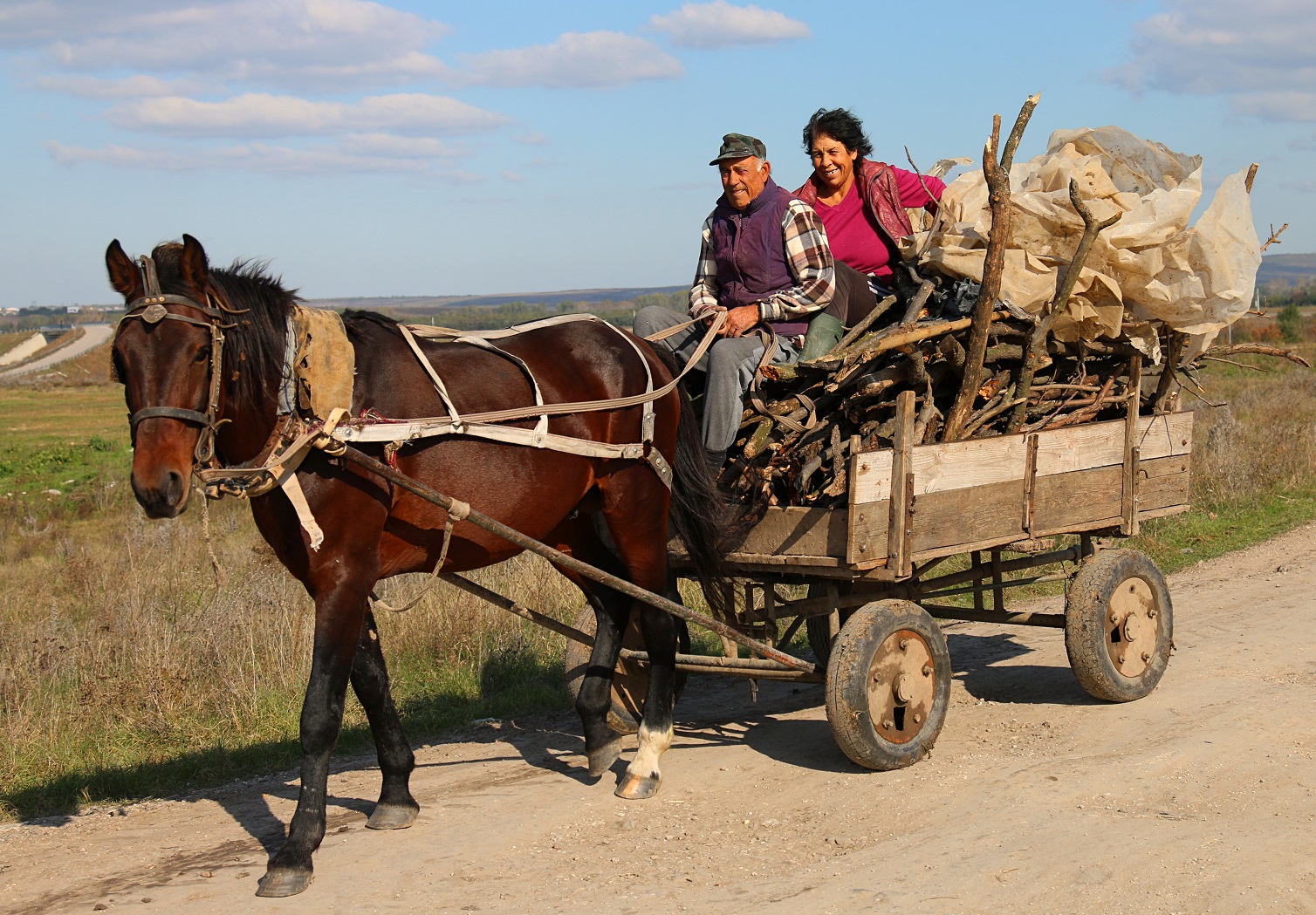
31 Mar 12: Land of milk & donkeys (Bulgaria)
Tran to Harmanli, Bulgaria (23 Oct – 2 Nov)
Total miles cycled: 1,950 (3138km)
Thigh status: Baby manatee
My first day in Bulgaria doesn’t bode well. The sky is black and buckets of rain thump down outside my window. I spend an exhilarating 20 minutes wrapping all my electrical equipment in plastic bags, then venture tentatively out. Ten minutes later, I venture back in again. I can’t see a thing through my glasses and my padded underpants are already sodden. This is almost certainly how I’ll be spending my dotage so I’d rather not start now.
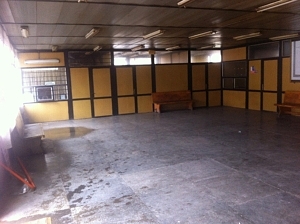
The palatial Tran bus station.
Instead I make my way to the Tran bus station. This transpires to be a grim concrete bunker with water pouring through the roof into oily pools on the floor. A woman in a dark, grimy cubbyhole tells me the next bus to Sofia goes at 1pm. So I return to the hotel to wait it out over a cup of tea and bowl of intriguingly titled ‘paunch soup’ – an experience I still have troubling flashbacks about today. Suffice to say, if a soup costs under 30p there is usually a reason.
When I return, I discover the bus is tiny with almost no boot. But I strip Maud down to her bare essentials and a supportive group of about 17 bystanders help me squeeze her indelicately inside. Then we’re off, and for the next three miserable hours, we plough sluggishly through the tsunami towards Sofia.
By the time we arrive, the rain has slowed to a funereal drizzle and I cycle the final 8km in the growing gloom over heavily cobbled streets and thick traffic. Pavements appear and disappear on a whim, along with the occasional half-arsed bike lane. I have a vague idea where I’m going, having located it earlier on Google maps, but find myself wishing not for the first time that I had a sense of direction. It could come in handy at moments like this, when trying to find somewhere.
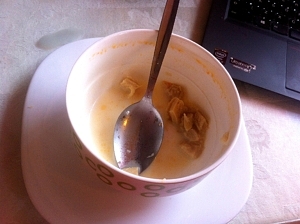
The remnants of my ‘paunch’ soup, which turns out to be tripe. One stomach lining ingesting another just seems monstrously cannibalistic to me.
I finally arrive at the house of my hosts, a family I found on the cycling couch-surfing website Warmshowers. They have a newborn baby and hyperactive two year old, and the flat is in disarray. She is exhausted and barely able to speak, while he does his best to drag the infant off me while serving cold red wine and pizza. What possessed them to host me, I think to myself? Are they some kind of cycle-obsessed sadomasochists?
Maybe, as it turns out. They are keen cycle tourers, they tell me, and like to take the children with them. This to me sounds like the worst kind of self-inflicted torture – unless it’s possible to harness the wee cherubs like huskies or use them to hunt for food.
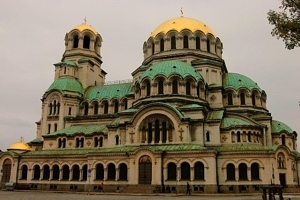
The St. Alexander Nevsky Cathedral in Sofia, built in the Neo-Byzantine style in the late C19th and early C20th. It is one of the largest Eastern Orthodox cathedrals in the world.
They are a sweet couple, however. He is Welsh and works for the British Council, while she is Bulgarian and an electrical engineer. They are gentle sorts with a beatnik edge and unkempt charm. He tells me about the quirks of the country through the eyes of an ex-pat. People shake their head when they mean yes, he says; except those who have been abroad, who tend to nod. So the country exists in an almost constant state of unresolved ambiguity – which may go some way towards explaining why nothing has really been achieved over the past couple of decades.
Tensions still exist between the majority Orthodox Christians and minority Muslims, I learn, and there are concerns about the influence of Turkey that hark back to the Ottoman Empire. We then get onto food, and he confirms my belief that all waiters here are miserable cretins. ‘They expect tips no matter what. There’s no sense of paying for good value.’
On the positive side, the family culture in Bulgaria is very useful, he says. His wife’s mother takes their son every weekend, allowing them some much-needed relaxation time. Wow, I think, watching little P eat the curtains while destroying the parquet floor with his plastic Triceratops. Poor woman.
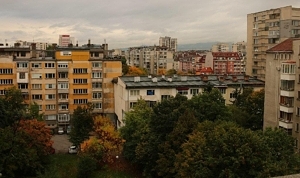
View of ex-Comecon, Brutalist tower blocks from my second hosts’ flat in Sofia.
The next day, I venture into Sofia to explore. Everyone is huddled up as if braving an arctic tundra and seems sad, brittle, brusque. The city itself is attractive, however, full of striking buildings, musty churches and handsome, stray mutts. The architecture is grand and diverse, from the Roman-Byzantine Rotunda of St. George and Neo-Renaissance market hall to the Stalinist Gothic public buildings and Brutalist tower blocks. There’s also a pleasant aura of tolerance about the place, with a church, mosque and synagogue co-existing happily on one of the main squares.
Over coffee, a young lawyer gives me her take on the country. It’s difficult to get anything achieved here, she tells me. Bureaucracy is huge, its cogs oiled by bribery and corruption. Everyone takes their cut: the politicians, police, judges, doctors. ‘Nobody has the will to reform the system,’ she says. ‘Because everyone hopes they’ll eventually benefit from it.’
Despite being an EU country, Bulgaria’s average wage is just €450 a month. Few pay their taxes because they can’t afford to and don’t trust the government. ‘Many people are leaving,’ the lawyer says. ‘Though it’s getting better. Young people have more job prospects than five years ago.’
I move to my second Sofia home later that day. My new hosts are a pleasant young couple with a baby, who chat with me into the early hours. Tensions are growing between Muslims and Christians, they report ruefully, with a climate of fear fomented by nationalistic parties clambering for power. Only a few weeks ago, the Orthodox Church called on the government not to let any more Muslim refugees into the country to prevent an ‘invasion’, they say.
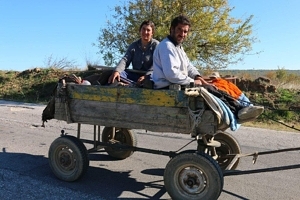
Cheery Roma folk on the road. We have a pleasant ten-minute, entirely incomprehensible conversation before going on our way.
Is the country safe, I ask them? ‘Be wary,’ R, the woman, tells me, especially where the Roma are concerned. ‘One village might invite you in with open arms, but the next may rob you blind. And you have no way of knowing which is which.’
This makes me a little nervous, but I’m aware that fear-mongering is often worst among locals, who are exposed daily to media and political hype about the wolves lurking at the door. In my experience, the reality is almost always better than the perception. And the Roma have long been the last vestige of socially acceptable discrimination, even among the most progressive of souls.
In the morning, R makes me cheese on toast while breastfeeding the baby. Very few people breastfeed in Bulgaria, she tells me, as they think it’s not as good as vitamin-heavy formula: a hangover from the Soviet era, when women were encouraged to return to work quickly.
Plus, there’s apparently a prestige inherent in buying things rather than squeezing them naturally from one’s nipples. ‘We’re a proud nation,’ R says. ‘People have a chip on their shoulder about being poor and see western consumerism as allied to progress. They buy Ferraris and can’t afford the fuel.’
Resignation and disappointment are clear in R’s voice as we talk. Their flat is large and clean, but dingy and cluttered. Both she and her husband have good jobs, but they are evidently struggling. It’s a dull, normalised poverty; unremarkable, unrelenting, unsexy. A low, heavy hum.
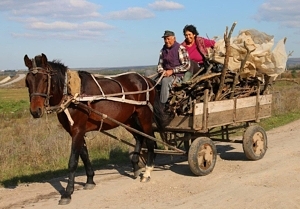
Cheery Roma folk on the road. We have a pleasant ten-minute, entirely incomprehensible conversation before going on our way.
Like some kind of pathetic fallacy, it rains constantly in Sofia while I am there, so I spend a couple of days catching up on admin and work at the cafe +TOVA. There I meet O, an art teacher from Washington DC, who kindly warns me about Bulgarian dogs. They can be large and dangerous, he says, though since he arrived five years ago he only knows two people who have been killed.
‘Sorry,’ I say. ‘Killed?’ Yes, he confirms. But they were both fairly old, so not to worry.
Later on, I meet a woman who provides legal support to refugees and Roma communities through the Bulgarian Helsinki Committee. Once Roma enter the spiral of poor education and crime, the battle is already lost, she says. ‘There’s no policy to deal with these issues, just systematic discrimination. Until a couple of years ago, even schools were segregated.’
Where refugees are concerned, Bulgaria was caught entirely unprepared, she tells me. In 2011, it had around 1,000 asylum seekers; in 2013 it was ten times that amount. There were no refugee centres, and integration centres were overwhelmed. ‘The media calls refugees illegal immigrants, while far-right parties say they are terrorists. It scares a lot of people.’
My final host in Sofia is D, a keen cyclist who lives a small, grubby flat in a dank ex-Comecon tower block. Over the next couple of days, he generously buys me food and drink, helps me service my bike, takes me up Vitosha mountain and gives me a spork (not a euphemism).
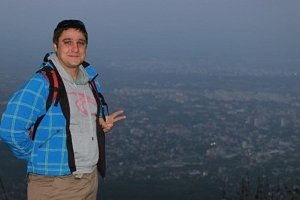
My third host in Sofia, who kindly takes me up Vitosha mountain and gives me a spork.
When I finally leave, he leads me 16km to the outskirts of the city before leaving me to continue on alone. It’s about 2C now and my hands and feet are numb. Having originally intended on outrunning the winter, I am not prepared for this weather and have had to pull together an impromptu outfit that involves four top layers and ankle socks alongside my sandals. It’s so important to be a leader not a follower of fashion, I think to myself, before posting a picture of my new look on Facebook.
My mother is quick to comment. ‘Well, at least you’re less likely to get raped,’ she writes. And with this ringing maternal endorsement in my ears, I head for the Balkan mountains.
After overnighting in the small, sweet town of Markovo, I set my sights on the traditional village of Koprivshtitsa. It’s a damp, grey flannel of a day, and I pass tractors, timber farms and a surprising number of incredibly slow-moving wrinklies hunched double, who I estimate to be somewhere between 300 and 400 years old. At one point, one of them beckons me over and asks me to set a large pile of dry leaves on fire for her. It doesn’t seem a very sensible thing to do, but I oblige helpfully.
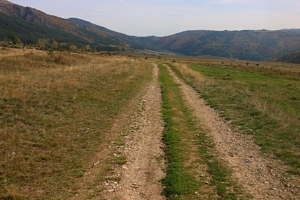
Going off-piste on my way to Koprivshtitsa. Who needs roads?
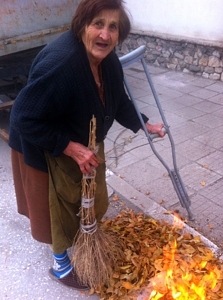
One of the ancient crones, sporting very similar footwear to myself, requests that I set her enormous pile of leaves on fire. Can’t help wondering if this is going to end in some kind of awkward Wicker Man scenario.
Then the day brightens and the mountains appear on my left, glowing red, orange, ochre and green in the soft morning sun. In my excitement, I accidentally veer off the main road onto a rocky, muddy track that draws me high into the hills. But it doesn’t last long, and the final climb through the mountains to the village is pure heaven.
Koprivshtitsa turns out to be a charming place full of vivid, multicoloured houses, ruggedly elegantly under neat terracotta roofs. The 19th century buildings have all been perfectly restored, and I learn that it was here where the first shot of the April Uprising against the Ottomans was fired in 1876.
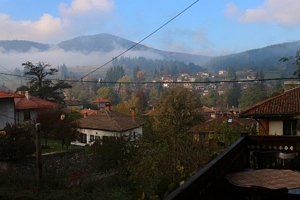
View of beautiful Koprivshtitsa from my guesthouse balcony.
Two days later, I am back on the road once more. And what a ride! Seventy-five glorious kilometres of downhill, my spirits soaring higher with every metre I plunge (though I have to admit being a tad put out by how easily cheered I am by a simple slope, having always thought of myself as a fairly complex emotional creature). At lunchtime, I arrive in Plovdiv, Bulgaria’s second biggest city and reportedly one of the oldest in the world, dating from 5,000 BC. It’s a lovely place, and has a bohemian artiness and vibrant architecture that resembles Koprivshtitsa writ large.
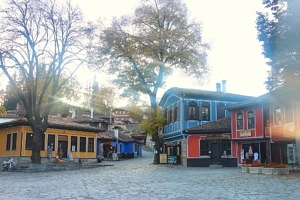
Colourful timber architecture in Koprivshtitsa, perfectly restored to capture the atmosphere of the C19th Bulgarian National Revival period.
As I check into my hostel, I see a leaflet for the mayoral elections on the counter. Is the owner going to vote, I ask? He shakes his head. ‘They’re all mafia. You have to pay for everything: 1,000 lev for an operation, 10 lev for a speeding fine. Companies have been shut down for not paying under-the-counter fees.’ He sighs deeply, adding: ‘Bulgarians don’t have enough money to worry about anything but today. We have a word for it: prahostnici.’
I leave after a couple of days for the refugee town of Harmanli, planning to stop in a hotel along the way. As I head off the main road to take a more scenic route, a man stops to warns me in German not to go this way as the road is ‘sehr klein und sehr schlecht‘. I thank him, but say I prefer small back-roads. Nobody understands the ethos of the cyclist, I mutter to myself as he drives away. They just don’t get it.
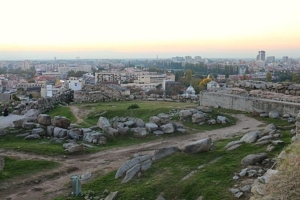
View from the top of Nebet (lookout) hill in Plovdiv. Evidence has been found that the site was settled as early as C12th BC as the Thracian town Evmolpiya.
Half an hour later, I’m lying face down in the road feeling a bit foolish. The holes had worsened, as predicted, until the asphalt resembled a pair of fishnet tights after a heavy night on the voddies. Then disaster struck. While ogling a particularly handsome donkey on a grassy verge, I failed to notice the railway track and ditch in front of me – and off over Maud’s frontal lobes I flew.
Excepting a few minor surface wounds, both Maud and I are fortunately ok. But my laptop is a different story. On impact, a carton of milk exploded in my rucksack, drenching everything. My computer, foolishly, was on, and I look on helplessly as the system short circuits before I can shut it down. Why did nobody warn me about the hazardous combination of milk and donkeys, I think to myself? Where were they on my risk assessment form?
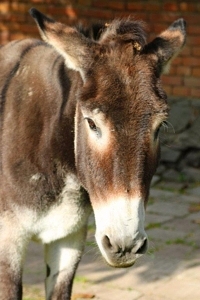
A Bulgarian donkey. Not the one responsible for the unfortunate mishap, but complicit nonetheless.
I schlepp on miserably to the hotel, which I discover in the middle of a wood. It’s large, pink and ominously empty. An old man takes me to my tiny room, which seems clean except for a couple of friendly cockroaches. At least, the sheets are refreshingly pube-free, which is my new yardstick for luxury.
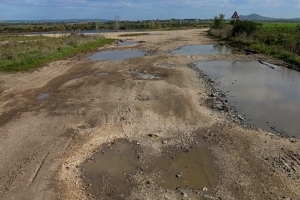
The excellent condition of Bulgarian roads. A lethal combination when mixed with milk and donkeys.
After an hour or so, I cheer up. This is helped considerably by the bottle of 2006 Zagreus Premium Reserve Cabernet Sauvignon I discover behind the dusty bar, which I tuck into with gusto. As I do so, the old man shuffles over to take my order. ‘What would you like?’ he asks (in German). ‘What do you have?’ I reply. ‘What do you want?’ he repeats. ‘Pasta?’ I say. ‘We don’t have pasta,’ he says. ‘We have sausages and potatoes.’
About four minutes later, he brings out a plate with a slab of dry beef and chips. ‘We didn’t have sausages,’ he says apologetically.
To be continued…
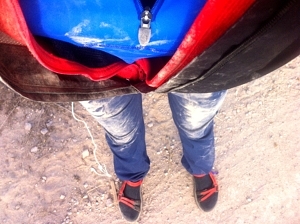
My ‘rape-proof’ cycling attire (post-fall).
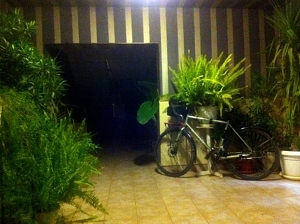
My Shining-esque hotel in the woods in the middle of nowhere. I am the only one there and everything is locked up and turned off downstairs at 8pm.
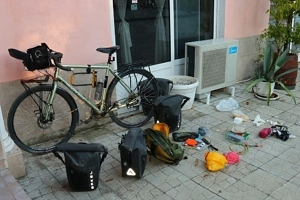
Tending to Maud at the hotel and drying out all milk-soaked utensils. If I only take away one lesson at the end of this trip, it’s NEVER carry milk on a bicycle (or a ukulele).
Follow my journey at Twitter at https://twitter.com/reo_lowe or Facebook at http://facebook.com/bexbicyclediaries.


joan
Posted at 19:34h, 03 AugustDelightful. and enjoyable but I don’t understand the timing of your posts in relation to when the action takes place. Is it the broken laptop? Oct-Nov was a long time ago……
Hope, wherever you are now, that all is well.
Bon voyage
reol8
Posted at 12:03h, 05 AugustHi Joan – many thanks for getting in touch. Yes, it was a long time ago… I was offline for about 2.5 months in Iran and already behind beforehand (due partly to laptop mishaps and mainly to general discombobulation). But I have a backlog of material now to upload, which I’ll be dripfeeding online over coming weeks. So please don’t go away! All best, Rx
Carol Morton
Posted at 14:54h, 15 AugustDear Rebecca – delighted to see your blog back on-line. Thoroughly enjoying your adventures and your writing: vivid, humbling and full of humour. I was delighted to spot you at a market in Iran and our brief encounter then. Your Uruguayan fan! Carol
reol8
Posted at 17:20h, 31 AugustCarol, so lovely to hear from you. I still can’t quite believe you recognised me at the mosque in Isfahan – I have never known such celebrity! It will no doubt go down as one of the most memorable chance encounters of my life. Thanks so much for following, it really means a lot. And please do stay in touch. Hopefully we’ll meet again one day – in Montevideo perhaps! x
EDV-Support
Posted at 13:00h, 04 NovemberThank you so much for sharing your wonderful pictures. Really great job.
Mildrid
Posted at 18:50h, 13 MayIf anyone is here after taking a certain exam, I’m sorry for your loss of social life for the past 2 years.
Cool person
Posted at 19:10h, 13 MayThe sense of immediacy and use of a personal and involving narrative voice makes this blog entry so interesting! Such an eventful and exhilarating story! It was so so interesting to read this I care so much about this. I also think that children is the worst ‘self-inflicted torture’. Haha, this so relatable I feel like you’re my friend!
Cool person
Posted at 19:11h, 13 MayThe sense of immediacy and use of a personal and involving narrative voice makes this blog entry so interesting! Such an eventful and exhilarating story! It was so so interesting to read this I care so much about this. I also think that children is the worst ‘self-inflicted torture’. Haha, this is so relatable I feel like you’re my friend!
ifailedtheIB
Posted at 19:58h, 13 Mayreally enjoyed how you used the narrative structure to convey a sense of immediacy!
gottageta6plsIBgods
Posted at 02:38h, 14 MayWow, I genuinely connected with you with your use of synthetic personalisation, which allowed me to immerse myself in your writing, almost as if I was alive there. The use of the continuous present tense made it seem as though the events were happening collinearly with your words, and your descriptive imagery simply punctuated that. Really flourished that sense of immediacy for me, great writing!
(no but genuinely great writing, it was very fun to read!)
(Also hello fellow IB sufferers)
IBStudent
Posted at 05:01h, 16 MayThe utilization of incriminate details throughout this piece opts the reader to paint a narrative, a place such as Bulgaria, constantly filled between two contrasts of poor and rich, definitely a great interpretation of ”Travel writing” and a new take on a concept which has been plagued by modern needs of perfection from social media.
Also if you happen to be a student of a two year vigorous course which culminates into unbearable exams and have happen to be taking English A as you native language as well be an Higher Level student in that matter, this text will seem familiar to you!
MyFullNameIB
Posted at 09:39h, 16 MayI personally value her perspective in travel writing, and diligently hope this may be a part of ones examination where they will have to analyze this masterpiece for around 2 hours and for around 1000 words, and you know what would be cool, if the test wanted the reader to explicitly talk about immediacy
But its just a theory and really wont happen
MyFullName
Posted at 09:41h, 16 MayI personally value her perspective in travel writing, and diligently hope this may be a part of ones examination where they will have to analyze this masterpiece for around 2 hours and for around 1000 words, and you know what would be cool, if the test wanted the reader to explicitly talk about immediacy
But its just a theory and really wont happen